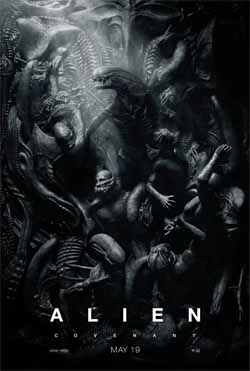
I really did not like Prometheus. The characters kept doing stupid things in order to create conflict and tension. The android antagonist seemed to act belligerently with no real reason to do so, and with the audience having no real idea what he was even trying to do. The tie-in to Alien also felt completely unnecessary and [more importantly] unwelcome. Apparently, the writers of Alien: Covenant saw those complaints and decided to double-down on all of them.
Covenant completely lost me as soon as the crew steps off the lander without any sort of environmental suits or helmets.
I could overlook the fact that the crew decides to land on the planet immediately instead of waiting for the storms to pass. Maybe they thought this was a rescue mission and time would be of the essence. Whatever.
I could excuse them for somehow completely missing the ruins of an alien city being within walking distance of the source of the transmission.
I could maybe even excuse the rapid pacing with which the alien gestates after being implanted by the facehugger, and how fast the alien grows. In the original movie, the facehugger was on the guy's face for like a whole day, then the chestburster doesn't pop out till the next day, and then it takes about another whole day for the xenomorph to grow to maturity. In Covenant, the whole process takes a matter of minutes or hours.
I could overlook all that stuff in a cleverer movie. But setting foot on an unknown alien world without even bothering to protect yourself from potential contaminants, and then setting the entire movie's conflict on infectious agents, is just unforgivable. Even Prometheus at least got that right ... until the crew decided to all take off their helmets because scans indicated that the "air is breathable".
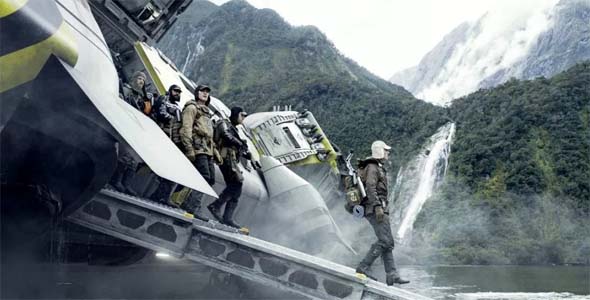
Why aren't you wearing environmental suits?!
You know what else is unforgivably stupid? Following a duplicitous android into his bio-weapon research lab and then sticking your face in an alien egg sac because he kindly asked you to. As soon as the captain found out that David had killed and/or experimented on Shaw, why didn't he just shot and killed him?
The movie is also a structural and pacing nightmare. The first 20 minutes of movie feels like pointless filler; while the last 30 minutes is a lazy, rushed rehash of the first Alien movie without any of the tension, suspense, or mystery. I could buy into the first thirty minutes being a "world-building" exercise, but not when you then go on to fail so miserably at world-building by not having your protagonists follow the most rudimentary of sci-fi safety procedures.
Aside from establishing the terraforming module, that first act really does absolutely nothing to set up anything later in the movie... [More]
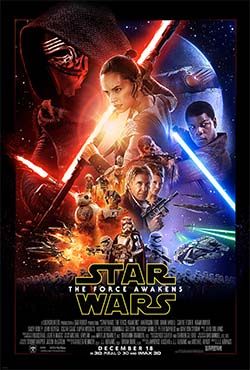
So where do I start ...?
... With the Mary Sue-ish protagonist?
... Or the McGuffin plot device?
... Or the uncomfortably rushed pacing?
... Or that the uncomfortably-rushed plot was a complete rehash of the first movie's plot, starting with hiding a secret document inside a droid and culminating in a trench run to blow up yet another Death Star?
... Or how about the other fan-service?
... Or the shallow character arcs?
... Or the completely throw-away characters like Phasma?
... How about the weak, forgettable original score?
... Or even how the lack of the 20th Century Fox fanfare made the title crawl feel weird?
Yeah, I came out of the movie with a very sunken, disappointed feeling. Heck, at first, I wasn't even sure if what I had just seen was even better than the prequels. But I'll give The Force Awakens some credit and say that it is better than the prequels. Despite Rey coming off as a Mary Sue, and despite that all the other characters have arcs that are completed within the first ten minutes of the movie (if an arc exists at all), the characters and performances are much better than what we got in the prequels. I thought that the friendliness and camaraderie between the heroes felt a bit forced, but that was partly the result of the rapid pacing of the movie. The Millenium Falcon seems to warp back and forth across the galaxy three times over the course of the movie, and hyperspace seems to allow virtually instantaneous transit now (another problem that Abrams carried over from Star Trek). Is travel instantaneous, or did these characters spend days or weeks bunking on the Falcon?
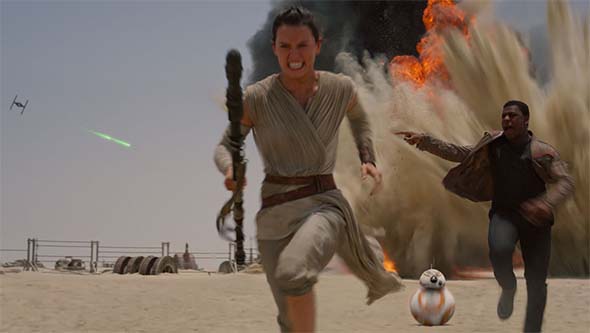
Rey feels like a Mary Sue character who fulfills a multi-film development arc in the span of a few minutes.
Rey is a Mary Sue character whose entire development occurs in the couple minutes that she's strapped into an interrogation chair; although I loved the witty subversion of the "damsel in distress" trope in the beginning of the film: "Stop holding my hand, I know how to run!". LoL. Fin's arc is basically complete within the first ten minutes of the movie. Kylo Ren has a shallow arc that is left unresolved so that it can be further explored in the subsequent films (I'm assuming he's probably going to have a redemption arc similar to Vader's in Return of the Jedi). Han and Leia don't have arcs, as they just have backstory. All their character development happened off-screen in the thirty intervening years. And I'm OK with that. I didn't expect Han and Leia's relationship to work out anyway. They had nothing in common except the fight against the empire. Once that was over, Leia was likely to go back to being a diplomat or politician, and Han would have to turn his back on the life of crime and mercenary work that he's good at in order to find a respectable job and avoid being a source of scandal and controversy. That wasn't going to happen!
So all the backstory made sense to me, and was all pretty much what I expected. That is, until the political situation came up... So there's another republic now (makes sense), and that republic is the dominant governing power in the galaxy, right? And then there's this small, Cult of Darth Vader that calls itself the First Order. The First Order isn't the empire (or even the remnants of the empire), but they use the empire's stormtrooper armor, TIE Fighters, and Star Destroyers out of reverence for Vader. And they hold no actual power or influence, right? They don't even recruit soldiers from the general galactic population. They either kidnap children, or grow them in test tubes to be raised to fight as stormtroopers (and maybe even as officers, as suggested by the youthful General Hux). The only sympathy or cooperation that they receive is from fear and intimidation, which for some reason, the republic is either unwilling or incapable of doing anything about?
And then there's this resistance that Leia is supposedly in charge of, and that everyone in the galaxy seems to know about. What are they resisting? They're not resisting the republic. They seem to be resisting the First Order, and that they are sanctioned by the republic but not an official part of the republic. Well why not? Why are they still a small, ragtag group of former rebels that are apparently hiding away in secret bases? Why isn't the "resistance" just the republic's army or some sort of special operations unit? I'm sure that this sort of stuff will be explained (and hopefully make more sense) in the follow-up movies (or maybe it's already been explained in official books or whatever), but that doesn't change the fact that it made no sense in this movie. It's just another example of J.J. Abrams seeming to have no comprehension of the size and scale of the universes that he's working in.
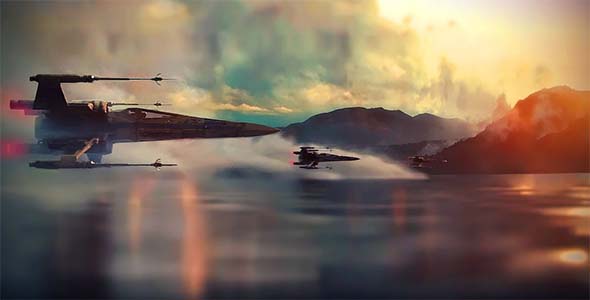
The political situation is very poorly explained. Who are the "Resistance",
what are they resisting, and why aren't they part of the new republic's official military?
The overall plot works well enough for the first two-thirds of the movie. [More]
1bcaf929-ccd8-459b-ad75-83c64757b83e|2|3.0
Tags:Star Wars, Star Wars: the Force Awakens, episode vii, Disney, Lucasfilm, Rey, Finn, FN-2187, Han Solo, Chewbacca, Leia Organa, Luke Skywalker, Kylo Ren, Snoke, First Order, republic, resistance, rebels, Starkiller Base, Death Star, droid, BB-8, lightsaber, McGuffin, spoilers, Lawrence Kasdan, reboot, soft reboot, J.J. Abrams
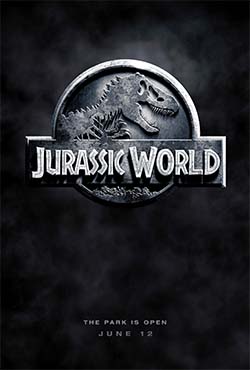
Jurassic Park is one of my earliest and strongest movie memories. I think I saw it at least four times in theaters when I was a kid. Even at that age, I rarely ever saw a movie more than once in a theater. Probably because I couldn't convince my parents to take me more than once, so if I wanted to go again, I'd have to go with a friend or a cousin. But that movie was good enough that I think even my mom and dad went multiple times.
I had a bunch of the Jurassic Park toys, including the character action figures, the large dinosaurs, the jeep, and even the compound playset with the fence and the gate. It was a very monumental movie in my youth that also shaped my perception of movies going forward, as well as helping to spark my interest in science. The awe and wonder of it captured my imagination and held very tightly for a very long time. Its scenes, images, dialogue, and music have all stuck with me to this day.
Perhaps because of this, my favorite parts of the newly-released Jurassic World were the brief scenes of the kids exploring the theme park. I enjoyed the brief clips of the petting zoo where kids fed the baby dinosaurs and rode on the backs of baby triceratops. I especially liked the little playground set where the kids would pretend to dig up dinosaur fossils. Seeing the kids on screen enjoying the awe and wonder of the animals sent me on a nostalgia trip to 20 years ago. The idea of people interacting with these animals is still just as captivating as it was then. There was a very addictive, light-hearted sense of joy and energy throughout these short-lived segments.
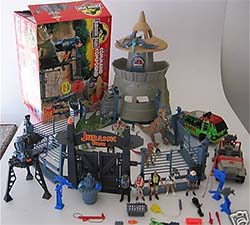
I had many Jurassic Park toys when I was a kid.
Even a more depressing mid-movie scene in which Chris Pratt and Bryce Dallas-Howard try to comfort a dying dinosaur was a touching moment that I really liked. It reminded me of the triceratops scene from the first movie, and the dinosaur was surprisingly expressive.
I did think it was weird that the director chose to play John Williams' trademark Jurassic Park theme as fanfare for what was effectively just a scenic helicopter landing. I get that it was an homage to the first movie, but I feel that the first movie built up to the arrival in the park, and paid off the fanfare with the classic money shot of the brachiosaur grazing in the open field. In Jurassic World, it just kind of felt like going through the motions. Imitation for imitation's sake.
In any case, these fun scenes with the dinosaurs is definitely not the point of the movie, and these sorts of scenes and moments get shoved to the side in order to make room for the film's main plot.
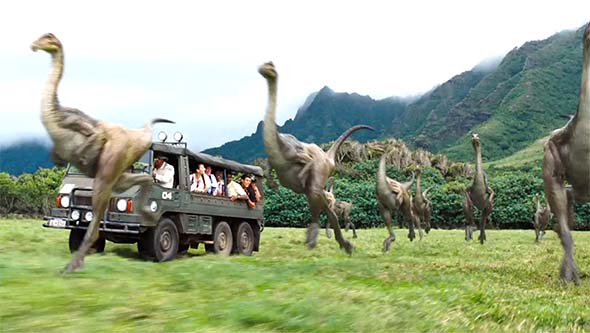
My favorite scenes were the ones of people enjoying the park.
I was skeptical about Jurassic World from the very first trailers. I worried that it would surely miss the point.
Michael Crichton's novels and the first movie weren't about "science gone amok"; it wasn't a Frankenstein story about mad scientists creating monsters. It was about well-intentioned scientists who underestimated the complexities of nature... [More]
cff200f8-7318-4106-acba-c55d8a57cd62|0|.0
Tags:Jurassic World, Jurassic Park, Universal Studios, dinosaurs, nature, science, theme park, Michael Crichton, science fiction, allegory, parable, consumerism, anti-consumerism, ethics, captivity, cloning, genetic engineering, indominus rex, tyrannosaurus rex, velociraptor, mosasaurus, In-gen, Sea World, Free Willy, Chris Pratt, Bryce Dallas-Howard, reboot, soft reboot
|

| 12 | | | | | | | 60 | | 11 | | | | | | | 55 | | 10 | | | | | | | 50 | | 09 | | | | | | | 45 | | 08 | | | | | | | 40 | | 07 | | | | | | | 35 | | 06 | | | | | | | 30 | | 05 | | | | | | | 25 | | 04 | | | | | | | 20 | | 03 | | | | | | | 15 | | 02 | | | | | | | 10 | | 01 | | | | | | | 05 |
|